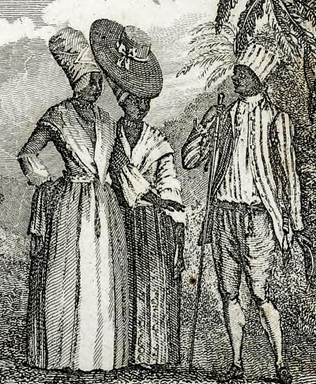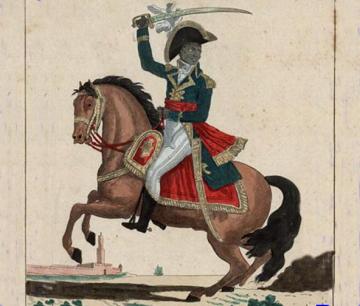|
Having interested myself in Olympe’s anti-slavery writings, and Brissot’s Club des Amis des Noirs, I was delighted to find a series of texts relating to the citizenship of ‘People of Colour’ of Saint Domingue (now Haiti) written in 1791. Why the quotation marks? Because it turns out that ‘Person of Colour’ in 1791 meant something rather different from what it does now. Specifically, it did not mean a black person. The author of the text, Julien Raimond, identifies himself as a person of colour in the text in which he argues that free men of colour ought to be granted the status of active citizens in the colonies. They deserve this status as much as the white men, he says, because like them, they are free. So first, Raimond does not ask that slaves should be granted the status of citizens, nor indeed that slavery should be abolished. Secondly Raimond argues that all men of colour, regardless of their degree of whiteness, ought to be granted the same status, as otherwise, brothers and sisters, parents and chidlren, would be turned against each other. In order to make this argument, he says that he needs to explains what he means by ‘People of Colour’ and ‘degree of whiteness’. A child issued of a white man and a black woman is a mulatto (mulatre). A child issued of a white man and a mulatre is a quarteron, or second degree. A child issued of a white man and a quarteron is a tierceron, or third degree. A child issued of a white man and a tierceron is a metis, or third degree. The colour of the skin of a metis, Raimond says, is indistinguishable from that of a white person. Any person belonging to that group is referred to as a ‘Person of Colour’. Julien Raimond himself was the son of a mulatto, Marie Bagasse, and a planter. He became a wealthy slave owner. In 1785 he moved to Paris and eventually became a member of the French National Assembly during the Revolution and helped Toussaint Louverture write the first Haitian Constitution. Raimond notes, without commenting on it, that prejudice means that couplings will always have to be of a white man with a woman of colour.
This is part of the reason why citizenship should be granted to all free people of colour, regardless of their degree of whiteness: a brother and a sister, both tierceron, will otherwise risk belonging to different classes. The sister might marry a white a man, in white man, and then her metis children will become citizens, and they will look down on their cousins who are not.
0 Comments
Leave a Reply. |
About
This is where I live blog about my new book project, an intellectual biography of three French Revolutionary women philosophers. Categories
All
Archives
November 2022
|


 RSS Feed
RSS Feed